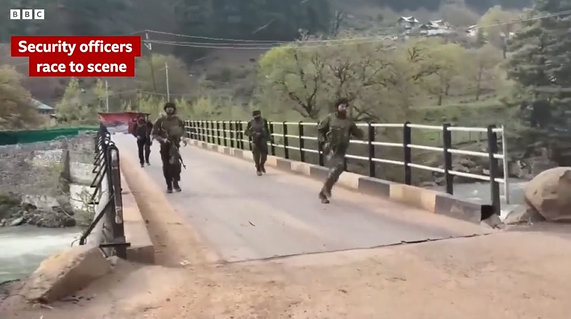

First responders on the scene after gunman opens fire on tourists at Pahalgam/SCREENGRAB/BBC
India has announced measures targeting Pakistan, a day after 26 people were killed by gunmen at a Himalayan tourist attraction in Indian-administered Kashmir.
They include the closure of the main border crossing linking the two countries, the suspension of a landmark water-sharing treaty, the expulsion of diplomats and an order for some Pakistani visa holders to leave within 48 hours.
Pakistani officials, who have denied the country's role in the attack, are meeting on Thursday to come up with a response, its foreign minister said.
The attack in Pahalgam was one of the deadliest in recent memory for the restive region - and is threatening to aggravate already icy bilateral ties.
India and Pakistan both claim Kashmir in full but control it only in parts. Since India's partition and the creation of Pakistan in 1947, the nuclear-armed neighbours have fought wars over the territory.
The Indian government has responded furiously to the attack and has signalled it holds Pakistan indirectly responsible. India has long accused successive governments in Islamabad of supporting armed groups in the region, which Pakistan strongly denies.
"Those behind this heinous act will be brought to justice," Indian Prime Minister Narendra Modi said in a post on X. "Our resolve to fight terrorism is unshakable and it will get even stronger."
India also said it would suspend the Indus Water Treaty - a treaty that has been in place since 1960 and survived decades of hostile diplomacy.
The treaty gives India control over the eastern rivers, and Pakistan the western ones, of the Indus river and its tributaries. The agreement stipulates that India must, with few exceptions, allow water from the western rivers to flow downstream into Pakistan.
Indian security agencies believe a group called the Kashmir Resistance was behind the attack, though BBC News has not independently verified that.
A manhunt for the gunmen responsible was continuing on Wednesday evening.
Pakistan's government said its National Security Council - the country's highest military and security body - would meet on Thursday.
In the aftermath of the Pahalgam attack, the Pakistani foreign ministry said it was "concerned at the loss of tourists' lives" and expressed condolences.
Under the measures announced by India on Wednesday, Pakistani military advisers based at the Delhi embassy were told to leave immediately, and more diplomatic expulsions are planned for next week, a statement said.
The Pahalgam attack risks reigniting long-running tensions between the nuclear-armed rivals.
Earlier, Defence Minister Rajnath Singh also signalled India's response would go beyond targeting the perpetrators.
He said: "We will not only reach those who have perpetrated this incident but also those who, sitting behind the scenes, have conspired to commit such acts on the soil of India."
The attack has been widely condemned by international leaders and has generated outrage and mourning in India.
Eyewitnesses have described chaotic and bloody scenes as holidaymakers including entire families fled for their lives.
Some witnesses said it appeared the gunmen targeted non-Muslims but others have described the shooting as random.
Most of the victims were Hindu men, though a local Muslim man was among the victims.
"We cannot get over the fact that such an incident has occurred, and that too in the place we call heaven on earth," Akib Chaya, a hotel owner and a member of the Kashmir Chamber of Commerce, told BBC's Newshour.
"Tourists have been coming to Kashmir since the last three or four decades and they have never been touched."
India's government has not given an official account on whether people were targeted on the basis of religion.










